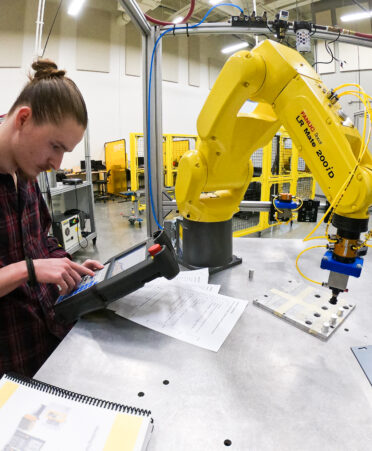Summary
Automation is a process by which things are done. Robots, on the other hand, are often the machines that actually do the tasks.
(ROSENBERG, Texas) – The demand for robotics and automation specialists is growing. As of May 2022, Texas sat as the third highest employer of robotics and automation technicians in the country, according to the U.S. Bureau of Labor Statistics.
But what does that mean for students looking to get into the industry? Additionally, what is automation and why are robots so closely tied to it?
Charles Sparks, lead instructor in Texas State Technical College’s Robotics and Industrial Controls Technology program at the Fort Bend County campus, described automation as anything not requiring human input to operate.
“Anything that activates without a human is automation,” Sparks said. “An automatic transmission is automation. So is the engine kill that happens when your engine overheats.”
Automation helps handle what would otherwise be mundane, repetitive tasks or makes certain tasks run the same way, every single time. Automation is a process by which things are done. Robots, on the other hand, are often the machines that actually do the tasks.
“Robotics can stand alone from automation but most of the time it doesn’t,” said Aron Guajardo, the newest instructor in the program. “Automation is all about doing things with less manpower, and robotics are a component of doing that. Take a robot that threads pipes. You don’t want the robot trying to make a thread in the air, so you add a sensor that tells the robot when and where to start.”
Without the sensor, the robot only knows what to do, not how to do it. A robotics engineer could stand by and manually tell a robot how to perform its job over and over again, but adding a sensor to automate the process is quicker, more efficient and cheaper.
Still, for every process that is automated, there is a human behind the scenes who programmed the robots and how the systems should interact.
“There is a degree of programming in robotics,” Guajardo said. “But not everyone’s job deals with that. Many are there to make sure that the robots are clean and maintained.”
Robotics teams can either work on programming or maintaining the robots. Making sure that the robots are up-to-date and functioning at their best is crucial to a successful process.
When students go through the program at TSTC, they are taught both the programming and maintenance side. While Guajardo believes graduates of the programs can easily go on to become automation technicians, he said that they could also go on to specialize in robots.
“One of the companies I worked for was wanting to integrate robotics into their process,” Guajardo said. “That kind of work, of building robots and implementing them, is also available to students.”
TSTC offers an Associate of Applied Science degree and a certificate of completion in Robotics and Industrial Controls Technology at its Fort Bend County and Waco campuses. The program is part of TSTC’s Money-Back Guarantee, which refunds a participating graduate’s tuition if he or she has not found a job in their field within six months of graduation.
Registration for TSTC’s fall semester is underway. For more information, go to tstc.edu.
